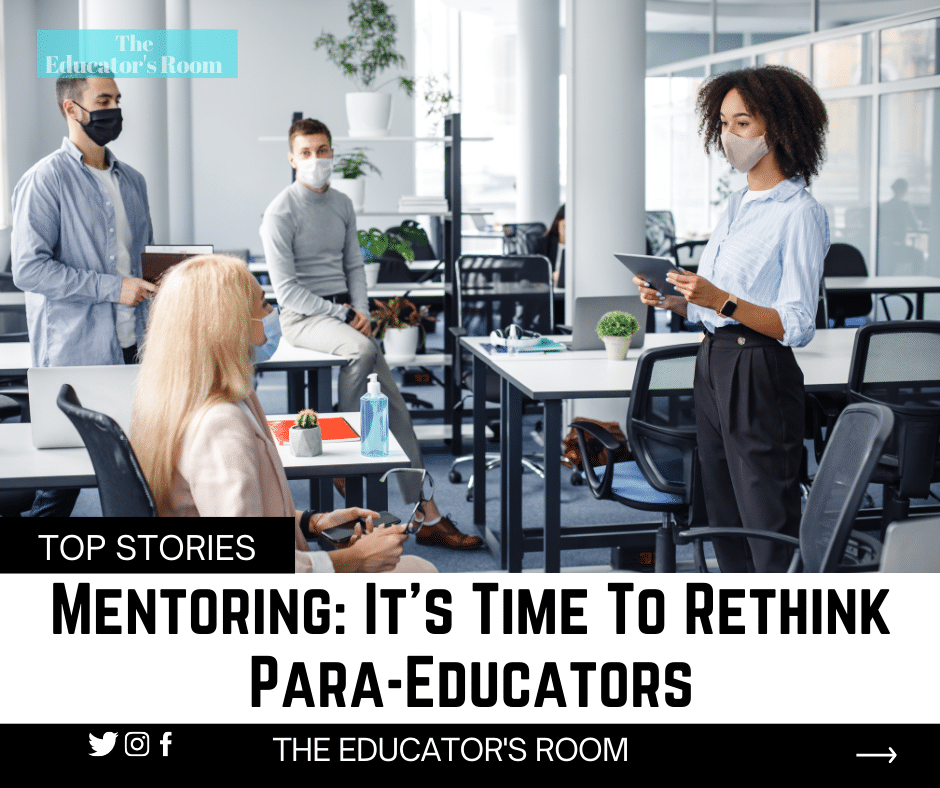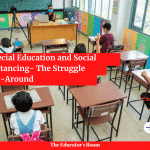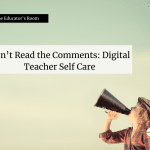Mentoring.
Recently, several articles have appeared suggested mentoring may be a way to help with the academic loss that educators are calling the “covid slide”. That’s abuzz too, and for good reason.
But I’m just as concerned, if not more so, about Natasha, who even in class is so incredibly shy that she can barely speak. Now online, her anxiety gets the better of her and she’s usually at the bottom of the Zoom participant list, her screen dark and muted. Or Ronald, who only shows himself under a blanket, whose face tells me he isn’t interested in sharing with a circle, whose single mother is working three jobs right now.
And every day, while I try my best to cover material, try my best to incorporate SEL, try my best to engage them all, I know that Natasha, Ronald, and so many others need someone to connect with, long before they connect with my online math lesson.
So it doesn’t surprise me that politicians, teachers, and leaders alike are talking about mentoring especially with a covid slide to contend with. And I love it because my school counselor is divided among three schools and almost 2,000 students. And more than a few of the families I serve can’t afford online tutoring services right now, and those rare services they once found in their community that was paid for with grants are shut down like a bear in winter.
And when it comes to mentoring, I can’t stop thinking that every para-educator is another person that can work alongside us, work alongside children, that we can train, that we can set up to mentor students at a time when students need them the most.
Why? Because a para-educator makes a perfect mentor academically, socially, emotionally, and much, much more.
We Need Para-educators Right Now More Than Ever
Teacher aides can work alongside students inside the class and in extra-curricular after hours. Recently, several periodicals have noted the effects of virtual clubs to help students engage again. Para-educators can assist in tutoring during office hours, help us in virtual clubs after hours, and importantly, they can assist teachers online and in hybrid mode to break up groups of students allowing for differentiation.
Many para-educators are excellent instructors themselves, and although they should not be in primary teaching roles, para-educators can and should work with small groups of learners allowing better chances for us to connect with students.
Para-educators are often adept at connecting with kids, and that’s important, especially so at a school like mine. Historically, students of color are often not taught by teachers of color. But since many para-educators are hired by the school directly, they are often more representative of the diverse group of learners and neighborhoods and not the demographic of the teachers. These individuals on campus should be a welcome part of the school community for this reason alone. But there is another one that is often overlooked by affluent staff. Research shows that teachers of color have higher expectations, on average, for students of color.
And that is a perfect foundation for mentorship that we should never have overlooked in the first place.
Even Virtually Aides Make a Difference
Any classroom teacher reading this, and certainly any principal who has jumped into a virtual lesson has seen that when utilized well, a para-educator makes all the difference in the world online. It should give us pause that we ever considered our classrooms without them back on campus! With an aide taking a smaller group, a teacher can differentiate instruction that otherwise they could not.
But there is more that teacher aides can do online. Aides can monitor chat allowing the teacher to focus on the lesson. Aides can also monitor kids and break out with them in order to do check-ins, talks if you will, that in many cases kids need right now. In my class alone, these occur almost daily for some children and they are game-changers. These moments, if supported by the school administration (or heaven forbid, encouraged!) could be all the difference in the world for students struggling to make it through their day, struggling to handle isolation, anxiety, and downright depression.
The History of Teacher Aides Turned Para-educators
Teacher assistants were once as much a part of our classrooms as a chalkboard and pencils. The 76 page NCLB “toolkit” demonized teacher aides and ushered in a new wave of strict accountability. This reduced their numbers dramatically, despite some parents saving to pay for them, and gave rigid guidelines to what they could do. And even though teacher assistants were a drop in the bucket for us financially, it just didn’t make much sense under NCLB to have them working with kids the way they once did said large districts. As the old saying goes, how’s that working for us now?
A Re-imagined Future
Whatever we call them, para educators can be the mentors that all kids need and that all kids in all neighborhoods deserve. They can be stepping stones for people who care about their own neighborhood schools to become teachers there themselves. I should know, I teach at a school just down the street from where I was an aide myself.
I imagine a world after Covid-19 where we finally realize that what students need goes far beyond a math and reading score in April, and finally some history and a couple of art lessons in May.
I imagine a world in which teaching assistants/para-educators are seen as the sources of inspiration they can be. Where we hire, train, support and pay them to work alongside students. Where we realize that what kids need is far more than reviewing a math test at the back of the room.
Why should we not get started on this reimagined future now, when para-educators are needed the most?
Thomas Courtney is a senior policy fellow with Teach Plus, CA, a guide teacher with SDSU, and a fifth-grade teacher in San Diego, California. He was also once a teacher aide in a first-grade classroom with Mary Merrill at Balboa Elementary–just down the street.







This is my fifth year as a special ed para-educator. It is by far the best thing I have ever done. I love my job, I love my kids. And every day I thank God that I get to do this. With the ever-growing list of requirements made of teachers, new regulations and increasing micro-management, I can honestly say that we are a vital part of the education of children. I’m glad that it’s in some way beginning to be recognized.
Hi Eileen. I feel the same way. I began teaching in ’99 and at that time, general education teachers were the norm for 2.5 hours a day in each of our classrooms. With the norm to inclusion, and with NCLB putting the onus on teachers, paras (then only called teacher aides) were pretty much removed from classes like mine. Now, I think this is a window in time for us all to explain to those who make policy and decisions that we need to rethink the importance of these educators who teach alongside us. Keep sharing your views with your colleagues! Best, Thomas